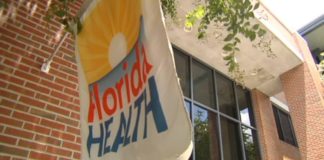
In most cases, monkeypox symptoms disappear on their own within a few weeks. But for those who are pregnant, children and people with weak immune systems, the disease can lead to medical complications, including death, according to the World Health Organization.
The administration plan includes immediately distributing about 28,000 courses of its existing supply of the Jynneos vaccine, the only vaccine that federal regulators have specifically approved to prevent monkeypox. Officials also said they were broadening access to the vaccines, which previously were limited to those with known monkeypox exposure.
“Now, we are recommending that vaccines be provided to both people with known monkeypox exposures who are contacted by public health, and to those people who have been recently exposed to monkeypox but may not be identified through case investigation and contact tracing,” said Rochelle Walensky, director of the Centers for Disease Control and Prevention. She added that people at-risk include those with close physical contact to a person diagnosed with monkeypox, as well as men who have sex with men who have had multiple sex partners in a “venue” with monkeypox spread.
She said people should be vaccinated within two weeks of a possible exposure, “and the sooner you can get vaccinated after the exposure, the better.”
The nation’s Strategic National Stockpile has 32,000 courses of the two-dose Jynneos vaccine in its inventory, said David Boucher, a senior official at the Department of Health and Human Services, which oversees the stockpile.
During the first distribution, vaccine allocation will be based on each state’s confirmed cases as a ratio of its population deemed at-risk of the disease. Men who have frequent sex with other men are believed to be at the highest risk. The initial tier of recipients includes Hawaii, Massachusetts, Utah, Illinois, New York, Rhode Island, California, Colorado and Florida and D.C., according to a draft distribution plan reviewed by The Washington Post.
More Jynneos doses are set to be distributed in later July after the United States receives additional courses of the vaccine.
U.S. officials will also continue to make available more than 100 million doses of ACAM2000, an older vaccine that was approved to prevent smallpox. While the vaccine is considered effective against monkeypox, the CDC has warned that it can cause serious side effects and cannot be used for people with severely weakened immune systems or eczema.
“The CDC will work with state, territorial, and local health departments requesting the ACAM2000 vaccine to ensure that individuals are fully informed on the benefits and the risks before receiving the vaccine,” the White House said in a fact sheet distributed Tuesday.
Top Biden administration officials also touted their recent efforts to expand monkeypox testing to thousands of locations around the country, as officials work to identify possible infections.
“I strongly encourage all health care providers to have a high clinical suspicion for monkeypox among their patients,” Walensky said. “Patients presenting with a suspicious rash should be tested.”
Public health experts have criticized the Biden administration’s response to the outbreak, saying the slow rollout of testing and vaccines parallels some of the mistakes made in early 2020, when the coronavirus pandemic first menaced the United States. For instance, the administration initially limited testing to several dozen public health laboratories, which some patients and physicians blamed for delays in getting test results. Experts also warned that the strategy hampered early detection of some infections and led to additional spread, raising the likelihood of the virus — which has repeatedly emerged in Central and West Africa for decades — becoming endemic in the United States, too.
David Harvey, executive director of the National Coalition of STD Directors, continued that criticism Tuesday, calling the latest announcement a “confusing mess” that did not explain the formula for distributing vaccines or how that might change as more vaccines become available.
“There are profound questions of how they will allocate limited vaccines to which jurisdictions, and states and local communities need a coordinated federal plan,” Harvey said. “We need to reach people who are at risk for monkeypox and conduct widespread vaccine efforts for gay people and other men who have sex with men.”
Advocates also are frustrated that the White House continues to rely on ACAM2000, which is considered less effective in fighting monkeypox, while officials wait for doses of the newer Jyennos vaccine to arrive from overseas, including more than 1 million doses being stored at Bavarian Nordic, the vaccine’s manufacturer in Denmark. The Food and Drug Administration still needs to conduct an inspection of the facility before those doses can be shipped to the United States, said two people who spoke on the condition of anonymity because they were not authorized to comment. The White House did not respond to questions about whether the FDA had inspected the facility.
PrEP4ALL and Partners for Health, a pair of public health organizations that have pressed state and federal officials to move faster on their monkeypox response, on Tuesday urged the White House to take steps to speed up vaccine production, such as establishing a manufacturing network that would meet global need.
“We must not allow the same failures of vaccine production and distribution that hampered the global COVID-19 response cause us to fail to contain the current monkeypox outbreak,” the groups wrote in a letter to senior Biden officials that was shared with The Post.
“What’s scary about it is [monkeypox] is much smaller than covid,” PrEP4ALL co-founder James Krellenstein said. “We have more than a million doses of a vaccine FDA approved for preventing monkeypox. And the U.S. government cannot figure out how to get it out of freezers in Denmark — doses that it owns — when there’s uncontained spread in the gay community. If this is a test run for pandemic preparedness, we are flunking.”








